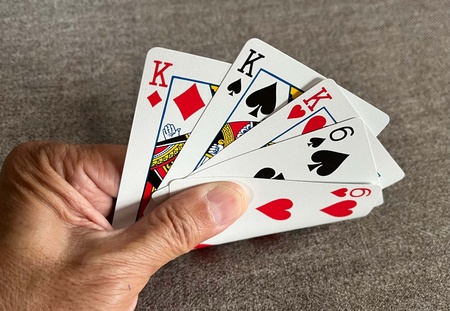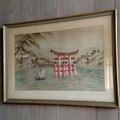Author’s note: My late Nisei father did indeed have a poker gang of his best friends who would meet monthly, always on a Saturday night, for decades, but this fictional short story—“The Poker Table”—is only loosely based on them.
* * * * *
Mom and I were in the kitchen that Sunday morning, preparing lunch, when we heard the crash from outside, followed by an angry round of expletives in both English and Japanese. My father might let out a cuss word here and there, but it was rare for him to launch into a bilingual string of them. We rushed out to the garage to find Dad pulling himself off the ground with his poker table sprawled next to him.
“Damn this table,” he said, as he dusted off his khaki pants.
“Are you all right? What happened?”
“I had forgotten how heavy this thing is.”
“Well, it’s been a while since you last took it out,” I said, helping him to pick up the table and lean it against the garage wall.
“Maybe I should just dump it. That’s what I should do.”
“Really?” I looked at him, not sure if he was serious or not. The poker table was older than I was, and I couldn’t imagine my father parting with it. Mom just stood there, saying nothing.
“After all,” Dad added, almost as an aside of no consequence, “Tanaka-san made it and I don’t want anything of his.”
Mom looked at me and shook her head before silently retreating back into the house.
Ever since I could remember, Tanaka-san was one of my father’s best friends. They both were in a long-standing card gang: seven men who had played poker together since the end of World War II. All veterans of the 100th Infantry Battalion of the 442nd, the highly decorated Army infantry regiment composed of Japanese Americans, the seven friends had returned to Honolulu from Europe at the end of the war and would meet once a month, always on a Saturday evening, to play poker late into the early morning. They took turns hosting the game, so I’d see these men only maybe twice a year, but they made a strong impression on my childhood, from the earliest time that I could remember.
“Dad, are you really sure you wanna get rid of the table?”
Without looking at me, my father rolled the poker table into the far corner of the garage, picked up a rake, and headed to the backyard, his private sanctuary and refuge. I wasn’t quite sure he had heard me and, even if he had, I figured the question might be too difficult for him to answer right now. My father was like that, often telling me more by what he didn’t say.
Over lunch, a simple but comforting meal of fried gyoza and fresh saimin topped with slivers of char siu, slices of tamagoyaki, and chopped green onions, Dad ate silently while Mom and I caught up on family gossip and the latest happenings in the neighborhood. After my parents had entered their early seventies and I became aware of their increasing frailty, I would spend every Sunday with them, usually helping with shopping errands and tasks around the house, but sometimes we’d just relax in the living room watching TV.
As we were finishing up with lunch, Mom retrieved a small stack of letters from the kitchen drawer and plopped them on the dining table. “I can’t seem to cancel our credit cards,” she complained. “Even after I call and write them, they just send more letters, saying they’ll keep our accounts active and increase our credit limits.”
“Mom, you gotta cut your credit cards in half and mail them back. That’s the only way they’ll get the message. I can help you with that, but why do you want to cancel your cards?”
“We don’t need them anymore,” Dad interjected. “We only needed them for traveling, but we won’t be going to Vegas or Japan anymore.”
Even though my parents were now undeniably in their elderly years, I still had trouble accepting the fact they there were no longer the active middle-aged couple who loved to travel. “Why don’t you just keep a couple cards, just in case?”
Mom looked at one of the letters, this one from American Express, and tossed it aside. “I think our travel days are well behind us. I can’t even see us taking a short trip to Maui anymore.”
“Too humbug now,” Dad added.
“Well, maybe keep just one card for emergencies,” I suggested.
Dad laughed. “You younger generation, everything’s an ‘emergency.’ Always charging this and that.”
I remembered how it was a point of pride for my parents that they always paid with cash for virtually everything, not just for appliances like refrigerators and stoves but also for their cars and even for their home, a two-bedroom ranch house in Kalihi, one of Honolulu’s residential neighborhoods. In fact, when they first applied for a MasterCard, they were turned down because they lacked any credit history. Then, after supplying considerable additional documentation, they were approved for a credit limit of fifteen hundred dollars, while I, just out of college, had several cards with well over that amount. But, at the same time, I was the one who struggled mightily to save enough for a down payment for a condo. Even with my decent job as an engineer, buying a place outright in cash was unthinkable.
“Dad, I never asked you before, but how did you afford this house without needing a mortgage?”
Dad looked and Mom, unsure of how to proceed—or, more accurately, he was trying to decide whether this was information that should be relayed to his son. My parents rarely, if ever, discussed their finances with me, but my father had reached that age when he realized that there was only a limited amount of time to tell me things that he felt I should know.
“We had the money from our tanomoshi,” he explained, referring to an informal credit club formed by his poker gang, in which everyone contributed a monthly amount and people would take turns borrowing from that sum.
Tanomoshi was a popular financial arrangement among Japanese immigrants, especially those on the mainland who, because of racial discrimination, especially around World War II, often had trouble obtaining loans from traditional banks. I knew that Dad’s poker gang had a tanomoshi, but I always thought it was for smaller things, like vacations and minor home improvements.
“I had no idea that you guys were loaning each other such large sums of money.”
“Oh yeah, we all helped each other buy homes, send kids to college, medical expenses.”
“But how did you decide exactly where the money would go? You must have had some fights or disagreements.”
“No, we never did,” Dad said without a moment of hesitation. “The money always went wherever it was needed most.”
I had to ask, “What about if someone was delinquent in paying back the loan?”
“People always repaid the money, usually ahead of schedule.”
“But how could you trust that everyone would?”
Dad looked at me as if he were trying to explain the simplest of things to a dimwitted toddler. “Why would we loan money to anyone we couldn’t trust?”
I had to laugh at myself for my stupid question. Dad had fought with these men on the battlefields of Europe. If they could trust one another with their lives, then they could trust one another with their money. Suffice it to say that Dad’s poker gang was no ordinary group of men. My father was a social person who had countless friends, but this gang of seven was special.
In Hawaii, we’re accustomed to calling anyone somewhat older either “uncle” or “auntie.” Teenage store clerks will say to a middle-age customer, “Uncle, the toilet paper is in aisle three,” or “Auntie, sorry but there’s a five-can limit on Spam.” This was especially true when it came to referring to the friends of our parents. Instead of calling them “Mr. Lee” or “Mrs. Takemoto,” we’d often just say “Uncle” or “Auntie.”
Dad’s poker gang was different. I always addressed them with their last name plus “san.” So it was Tanaka-san, Yamamoto-san, Fukuda-san, Aratani-san, Tokunaga-san, and Morimoto-san. I don’t know why this was so. I don’t even remember my father specifically instructing me to refer to his poker gang that way; that’s just how it always was. Maybe it was because my father wanted me to show particular respect to these men, who had served with him and had remained his friends over the decades. Whatever the reason, it was never “Mr. Aratani” but always “Aratani-san.”
Even after I had graduated from college and James and I had gotten our own condo in the Makiki area of Honolulu, I may not have seen the men as much as I used to but I was always aware of their strong presence in my father’s life. He would regularly fill me in with small talk about them: “Fukuda-san’s daughter just had a baby,” “Yamamoto-san and his wife are going to Japan next week,” “Morimoto-san’s son is studying to be a doctor.”
*“The Poker Table” was originally published in The Gordon Square Review (issue 12).
© 2023 Alden M. Hayashi






